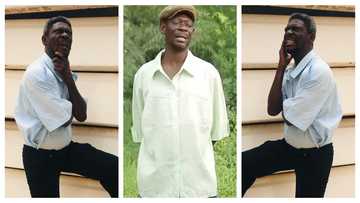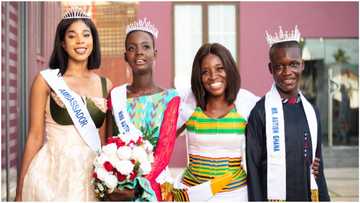Top 50 Akan proverbs and their meanings with explanation
The Akan people are ethnolinguistic groups primarily found in present-day Ghana and Ivory Coast. They speak the Akan language. Akan Proverbs are part of these people's rich traditions. They are wise sayings used to promote good behaviour, discourage vices, and maintain the community's beliefs.

Source: UGC
TABLE OF CONTENTS
- Top 50 Akan proverbs in Twi
- 1. Ɔkɔtɔ nwo anoma (Okoto nwo anoma)
- 2. Berɛ te sɛ anomaa, woankyere no na otu a, wonhu no bio
- 3. Nsa baako nkura adesoa
- 4. Opanyin a wommo ne bra yiye no na oda asaso
- 5. Dua kontonkyikuronkyi na ema yehunu odwomfo
- 6. Onyankopon danseni ne ahonim
- 7. Biribi annkɔka papa a, anka papa annye kyerɛdɛ (Biribi anka papa anka angye grada)
- 8. Nsuo a edo wo na eko w’ahina mu
- 9. Obea ye turom mu nhwiren, ne kunu nso ye ne ho ban
- 10. Prayɛ, sɛ woyi baako a na ebu; wokabomu a emmu (Praye, se woyi baako a na ebu: wokabomu a emmu)
- 11. Oyere te se kuntu, wode kata wo so a wo ho keka wo, wuyi gu ho nso a, awo de wo
- 12. Nea owo aka no pen no suro sonsono
- 13. Awareso ne awaregyae ne fa bi gyina nsewnom so
- 14. Ayonkogoro nti na okoto annya tiri
- 15. Dua a enya wo a ebewo w’ani no, yetu asee; yensensene ano
- 16. Obea ko aware a, ode ne na ko
- 17. Wohu se wo yonko abodwese rehye a na wasa nsuo asi wo dee ho
- 18. Obi Nkyere Abofra Nyame
- 19. Yewo wo to esie so a, wonnkye tenten ye
- 20. Obi kwan nsi obi kwan mu
- 21. Biribi annkɔka papa a, anka papa annye kyerɛdɛ
- 22. Aboa a onni dua no, Nyame na opra ne ho
- 23. Baanu so a emmia
- 24. Me Num Kankan So Me Dokunu Ka
- 25. Animguase mfata Okanni ba
- 26. Ti koro nko agyina
- 27. Nye Agoro Ne Kuto Ma Me Nhwe Wo To
- 28. Obi akɔnnɔdeɛ ne odompo nsono (Obi akonnodee ne odompo nsono)
- 29. Nyansapo wosane no badwemma
- 30. Owuo atwedee baakofoo mforo
- 31. Woforo dua pa a na yepia wo
- 32. Abofra bo nnwa na ommo akyekyedee
- 33. Obanyansofoo yebu no be, yennka no asem
- 34. Hu m’ani so ma me nti na atwe mmienu nam
- 35. Aboa bi beka wo a, ne ofiri wo ntoma mu
- 36. Anoma anntu a, obua da
- 37. Obi nnim obrempon ahyease
- 38. Agya bi wu a, agya bi te ase
- 39. Animguase mfata Okanni ba
- 40. Agorɔ bɛsɔ a, efiri anɔpa (Agoro beso a, efiri anopa)
- 41. Kwaterekwa se obema wo ntoma a tie ne din
- 42. Nsateaa nyinaa nnyɛ pɛ (Nsateaa nyinaa nnye pe)
- 43. Wamma wo yonko anntwa anko a, wonntwa nnuru
- 44. Yɛsoma onyansafoɔ, ɛnyɛ anamɔntenten (Yesoma onyansofoo, enye anamontenten)
- 45. Bɔɔfrɛ a ɛyɛ dɛ na abaa da aseɛ (Boofre a eye de na abaa da asee)
- 46. Obi nnim a, obi kyerɛ (Obi nnim a, obi kyere)
- 47. Abofra hunu ne nsa hohoro a one mpanyinfoo didi
- 48. Obi fom kum a, yenfom nnwa
- 49. Obaa to tuo a etwere barima dan mu
- 50. Hwimhwim adee ko srosro
- What are traditional proverbs?
- What is an Akan proverb?
- What are some of the Ghanaian proverbs?
- Why are Akan proverbs important?
- What is the Akan proverb for hope?
The essence of Akan proverbs is underpinned in the community's saying Ba nyansafoɔ yebu no bɛ, yɛnnka no asɛm. It loosely translates to "The wise child is spoken to in proverb, not in mere words.
Top 50 Akan proverbs in Twi
Here is a quick look at the best-known Akan proverbs and their meanings. You will learn a lot from them.
1. Ɔkɔtɔ nwo anoma (Okoto nwo anoma)
- Translation: A crab does not give birth to a bird.
- Meaning: This is one of the Akan proverbs in Twi. It acknowledges and describes the character or physical resemblance between a person and their child. It is the Twi equivalent of the apple does not fall far from the tree.

Read also
Kalybos rocks sleeveless dress and bob wig, feeds baby in video to mark Mother's Day: "So mummylicious"
2. Berɛ te sɛ anomaa, woankyere no na otu a, wonhu no bio
- Translation: Time operates like a bird while it is before you. If not caught, it flies away and never returns.
- Meaning: Human beings do not have the luxury of time. Therefore, you should do things the way you want. In life, time is an impatient visitor, so you should make the best of it when you can. If you do not, you will never regain whatever time you have lost. Therefore, the best time to do anything is now.
3. Nsa baako nkura adesoa
- Translation: One hand is never enough to lift a heavy load.
- Meaning: This proverb underpins the power of unity. All human beings are social creatures that need other people at every stage of life. When we synergise with others, we can do much more than we would have done individually.

Read also
"Come and help these kids": Dr Likee "cries" after hearing sad story, gets teary during orphanage visit in video
4. Opanyin a wommo ne bra yiye no na oda asaso
- Translation: If, as an elder, you do not live a worthwhile life, you will sleep in the living room.
- Meaning: The way you live your life now determines what becomes of your future. Life is an investment. Whatever we do today, whether good or bad, determines what we will reap tomorrow. This is the Akan equivalent of as a man lays his bed, so he lies on it.

Source: UGC
5. Dua kontonkyikuronkyi na ema yehunu odwomfo
- Translation: Crooked wood reveals who the true sculptor is.
- Meaning: Any sculptor may be able to work with good wood, but it takes a remarkably prolific one to make something out of crooked and unworkable wood. The wise saying is used to describe people who achieved success despite facing challenging beginnings.
6. Onyankopon danseni ne ahonim

Read also
Charlie Dior blasts James Gardiner for stepping on the red carpet dressed like a Menscook server
- Translation: A person's conscience is God's witness.
- Meaning: Every human is born with a conscience. Whenever one does wrong, their conscience registers the wrong even if the person does not want to admit it. This makes the said conscience the only witness of the wrongdoing, making it, by extension, God's witness.
7. Biribi annkɔka papa a, anka papa annye kyerɛdɛ (Biribi anka papa anka angye grada)
- Translation: If there is no smoke, there will not be a fire.
- Meaning: Just as Newton's law of motion states, objects are always at rest unless forces are exerted upon them. This wise Twi saying implies that nothing happens just by itself without a causative factor. Behind every noise, there is something producing the sound.
8. Nsuo a edo wo na eko w’ahina mu
- Translation: Only the water that was meant for you enters your pot.
- Meaning: When one lowers their pot into the river to fetch water, only a small amount gets in. The rest flows downstream. This wise sating means that only the people that were meant to be in your life will get into it. You will never get to meet the rest.
9. Obea ye turom mu nhwiren, ne kunu nso ye ne ho ban
- Translation: While a woman stands as a flower in a garden, her husband is the fence that protects her.
- Meaning: The two notable objects in the proverb are the flower and the fence. The woman is likened to a flower that is beautiful and delicate. On the other hand, the man is likened to a fence, often erected to protect a garden. By implication, every man should serve as a wall of protection around his wife. He must do his best to always secure her.

Source: UGC
10. Prayɛ, sɛ woyi baako a na ebu; wokabomu a emmu (Praye, se woyi baako a na ebu: wokabomu a emmu)
- Translation: When you remove one strand from the broom, the rest can easily break, but when you put them together, they do not break.
- Meaning: This is the Twi equivalent of the English proverb, in unity lies strength. This wise saying is meant to unite members of a community, making them strong against attacks from external forces.

Read also
"I didn't say I will stop working": Dr Likee explains his 'retirement' statement, shares future plans in video
11. Oyere te se kuntu, wode kata wo so a wo ho keka wo, wuyi gu ho nso a, awo de wo
- Translation: A woman can be compared to a woollen blanket, which, if you use it to cover yourself, you may feel irritated, and yet, if you remove it, you become cold.
- Meaning: This is an on-a-light-touch saying that makes fun of the conflicting characters of Akan women. The good side is equated to the warmth generated by the blanket, while the bad side is likened to the irritation some people experience from blankets touching their skin.
12. Nea owo aka no pen no suro sonsono
- Translation: A person who was once bitten by a snake is afraid of worms.
- Meaning: Although the worm is small and harmless, it is said to scare anyone who a snake has ever bitten. The proverb describes a person's extreme caution whenever he is in a situation that once caused him harm. It is the Twi equivalent of once bitten, twice shy.
13. Awareso ne awaregyae ne fa bi gyina nsewnom so
- Translation: The success or failure of a marriage is partly determined by the in-laws.
- Meaning: This explains the importance and roles played by extended families in a couple's marriage. It means that by what they do or fail to do, they can determine whether a marriage will succeed or fail.
14. Ayonkogoro nti na okoto annya tiri
- Translation: The crab lacks a head due to playing with friends.
- Meaning: This wise saying is also commonly phrased as Ayonko dodoo nti na okoto annya tiri, meaning the crab did not get a head because of its many friends. It highlights the downsides of having too many friends. There will always be characters amongst them who will lead you astray.

Source: UGC
15. Dua a enya wo a ebewo w’ani no, yetu asee; yensensene ano

Read also
"Instead of hating, tap into the anointing": MzGee advises as she flaunts smooth "blessing-filled" face in video
- Translation: One cannot sharpen the stick that will pierce his eye. Instead, he uproots it.
- Meaning: This saying highlights the essence of getting rid of potential perils early as opposed to letting them grow to the point of causing harm. It is the equivalent of prevention is better than cure.
16. Obea ko aware a, ode ne na ko
- Translation: The moment a woman gets into marriage, she does so with her mother.
- Meaning: A woman cannot be better than her mother trained her before she got married. Therefore, the way a mother raises her daughter determines her conduct when she becomes a wife. A mother is expected to teach her daughter all she needs to know about marriage beforehand.
17. Wohu se wo yonko abodwese rehye a na wasa nsuo asi wo dee ho
- Translation: If you see your neighbour's beard burning, fetch water for yours.
- Meaning: This saying means that every human being should learn from other people's experiences and circumstances. The misfortunes that befall others could get to you one day. If that ever happens, you should be well prepared because you have already seen them happening to others.

Read also
Ghanaian boy travels to study in Canada with his Aki-Ola textbook, man laughs at him in video
18. Obi Nkyere Abofra Nyame
- Translation: God does not have to be pointed out to a child.
- Meaning: God is omnipresent, and His acts are felt everywhere. He is also omnipotent, meaning that he has all power, and he is never limited to a place. If you look at everything around you, you will see that God exists. It is then assumed that if a child could believe that God exists merely by the things it sees, it would be foolishness for an adult to doubt or question the existence of God.
19. Yewo wo to esie so a, wonnkye tenten ye
- Translation: If you are born unto a mound, it will not take you long to grow tall.
- Meaning: This proverb underpins the importance of the privileges and advantages that some people get early in life and which carry them through their lives. A person born into a rich family, for instance, is more likely to remain rich than one born into a poor family.

Read also
"Speak with respect": Cookie Tee slams critics, defends Berla Mundi's "plenty talk" at VGMA 2023

Source: UGC
20. Obi kwan nsi obi kwan mu
- Translation: No man's path crosses another path.
- Meaning: This wise saying speaks about the essence of a person's destiny. When a man's path in life is set, it will lead him wherever he was meant. He cannot cross another path that may lead him to another destiny.
21. Biribi annkɔka papa a, anka papa annye kyerɛdɛ
- Translation: If something had not touched the dried palm frond, it would not have made a noise.
- Meaning: Whenever a dried palm frond makes a sound, something has touched it. While one may complain about the dry frond making noise, the frond can also complain that someone troubled it. The proverb highlights the essence of both sides of a story whenever there is a conflict.
22. Aboa a onni dua no, Nyame na opra ne ho
- Translation: God is the keeper of the body of an animal without a tail.
- Meaning: No matter how vulnerable a person may be, even if abandoned by all, God is always available to help them. This is a proverb of hope for anyone who seems to be dejected or rejected.

Read also
Ghanaians lash out at TikToker Yaa Baby for wearing a white dress to the 2023 VGMA; "This is not an Easter convention"
23. Baanu so a emmia
- Translation: When two people carry a load, it does not hurt their backs.
- Meaning: This is the Akan equivalent of the English saying, two are better than one. The saying encourages unity among members of the community.
24. Me Num Kankan So Me Dokunu Ka
- Translation: The odour in my mouth is enough to be munched on.
- Meaning: This proverb is often used when someone wants to stay aloof and not deal with a particular situation. When someone uses this proverb, they are saying they want to remain silent on a problem at hand without talking about or dealing with it.
25. Animguase mfata Okanni ba
- Translation: Disgrace never benefits the Akan child
- Meaning: Honour is among the most important virtues in Akan culture, and every member must do everything to maintain it. There is a saying among the Twi-speaking people that says it is better for a person to die than become disgraced or ashamed.

Read also
Dominic Fobih: 80-year-old former education minister marries young wife, photo and video spark reactions

Source: UGC
26. Ti koro nko agyina
- Translation: One person does not hold council.
- Meaning: A person deliberating an issue by himself cannot be said to have held a council. This proverb highlights the essence of having various people in the decision-making process.
27. Nye Agoro Ne Kuto Ma Me Nhwe Wo To
- Translation: Not all jokes are meant to be made.
- Meaning: This is trying to explain that there are some jokes which are expensive or may cost you something if you tell tell them. It is better to be silent than to make jokes that will cause trouble.
28. Obi akɔnnɔdeɛ ne odompo nsono (Obi akonnodee ne odompo nsono)
- Translation: What someone calls his delicacy is poison to another.
- Meaning: This is the Akan equivalent of one man's meat is another man's poison. What someone finds fun could be what another person considers uninviting. The saying generally explains that we all see things from different viewpoints so that which one person likes could be what another detests.
29. Nyansapo wosane no badwemma
- Translation: The knot of wisdom is untied only by the wise.
- Meaning: Not everyone can handle a conflicting matter. A delicate matter affecting society requires the attention of wise men. This proverb is the motto of Kwame Nkrumah University of Science and Technology.
30. Owuo atwedee baakofoo mforo
- Translation: Death's ladder is not climbed by one person.
- Meaning: If you are looking for Akan proverbs and their meanings in Twi you will not miss this one. The sating is used to speak to the certainty and universality of death by likening it to a ladder that must be climbed by everyone.

Source: UGC
31. Woforo dua pa a na yepia wo
- Translation: Only when you climb a good tree do people push you.
- Meaning: This proverb says that elders or society can only support you if you make good decisions. You cannot be up to no good and expect others to offer you their support.

Read also
Real-life turtle vs rabbit race happens in primary school, results in viral video causes stir online
32. Abofra bo nnwa na ommo akyekyedee
- Translation: A child breaks a snail, not a tortoise.
- Meaning: A child's strength is limited. It has enough energy to crash the shell of a snail but not enough to crush a tortoise's shell. This means that kids should do things that pertain to them and not those that pertain to adults.
33. Obanyansofoo yebu no be, yennka no asem
- Translation: A wise person is spoken to in proverbs, not plain language.
- Meaning: The Akan culture does not promote direct communication. Instead, proverbs are used in speech. Wise people are expected to understand the hidden meanings of things, unlike the unwise.
34. Hu m’ani so ma me nti na atwe mmienu nam
- Translation: Two antelopes walk together because they can blow the dust off each other's eyes.
- Meaning: Two is better than one. When you have someone walking by your side, you will have a better quality of life than a person that walks alone. Excessive independence and isolation are not encouraged among the Akan.

Read also
AirtelTigo's voiceover artist Natalia Andoh finally shows her face behind the voice in video
35. Aboa bi beka wo a, ne ofiri wo ntoma mu
- Translation: The animal that bites you will be from your cloth.
- Meaning: In life, it is likely that the people who will hurt you the most are those you consider close. They will hurt you the most because they know how best to do it.

Source: UGC
36. Anoma anntu a, obua da
- Translation: If a bird refuses to fly, it sleeps hungry.
- Meaning: Nothing ventured, nothing gained is the meaning of this proverb. If you want something and do not put effort into getting it, you will never have it. It encourages people to work hard for a good life.
37. Obi nnim obrempon ahyease
- Translation: No one knows the beginning of a great person.
- Meaning: The beginnings of greatness are unpredictable, and anyone can be great. Therefore, never despise anyone or humble beginnings.
38. Agya bi wu a, agya bi te ase
- Translation: When one father dies, another father lives.
- Meaning: It takes a village to raise a child. The saying is often used to encourage widows raising children on their own and orphans that the death of a spouse or father does not mean the end of life.
39. Animguase mfata Okanni ba
- Translation: Disgrace does not befit the child of an Akan.
- Meaning: Honour is a crucial virtue in Akan culture, so it must be encouraged and preserved. This saying tells all members of the community to avoid anything that brings shame to the community.
40. Agorɔ bɛsɔ a, efiri anɔpa (Agoro beso a, efiri anopa)
- Translation: An entertaining party or festival starts in the morning.
- Meaning: Human beings can tell how successful a venture will be from its beginning. If something looks like it is set for doom, it is best to avoid it.
41. Kwaterekwa se obema wo ntoma a tie ne din
- Translation: If a naked man promises you a cloth, listen to his name.
- Meaning: A man cannot give you what he does not have. If a naked man had clothes, he would wear some before giving them to you.

Source: UGC
42. Nsateaa nyinaa nnyɛ pɛ (Nsateaa nyinaa nnye pe)
- Translation: Not all fingers are the same.
- Meaning: Although we are all humans, we are not the same. Different people have different gifts, talents, and abilities. Therefore, appreciate and exploit what you have. Always remember that each person is capable of doing things that others cannot do.
43. Wamma wo yonko anntwa anko a, wonntwa nnuru
- Translation: If you do not allow your friend to cross and reach their destination), you will also not cross and reach yours.
- Meaning: The wise said that life comes to a full circle. What you do, good or bad, will come back to you. Therefore, do not try to stop someone from achieving their dreams or full potential. If you do, you jeopardise your destiny.

Read also
Gabby Otchere-Darko celebrates spare parts dealer for building ultra modern hospital, peeps react
44. Yɛsoma onyansafoɔ, ɛnyɛ anamɔntenten (Yesoma onyansofoo, enye anamontenten)
- Translation: The wise person is sent, not the one with long legs.
- Meaning: A person with long legs may run faster and deliver the message earlier. However, the way they deliver the message may be wrong. There is more to communication than just sending the words. Therefore, it is best to exercise wisdom when relaying messages.
45. Bɔɔfrɛ a ɛyɛ dɛ na abaa da aseɛ (Boofre a eye de na abaa da asee)
- Translation: A sweet pawpaw has a stick under it.
- Meaning: The pawpaw tree with the sweetest fruit always has a stick under it because everyone wants to pick the ripe fruit. People are known for their deeds. If you do good and are good, you will not lack people around you.

Source: UGC
46. Obi nnim a, obi kyerɛ (Obi nnim a, obi kyere)

Read also
Okyeame Quophi sparks controversy with "Nana Ama McBrown is the best at Onua" speech, peeps react
- Translation: If someone does not know, someone teaches.
- Meaning: There is absolutely no shame in not knowing something. If you do not know something, be willing to learn from someone who does. Failure to learn makes you foolish and ignorant.
47. Abofra hunu ne nsa hohoro a one mpanyinfoo didi
- Translation: A child who learns to wash their hands can eat with the adults.
- Meaning: Life comes in stages. We grow and learn. Children are immature and need to learn a lot before they can be admitted to the table of men.
48. Obi fom kum a, yenfom nnwa
- Translation: If someone kills by mistake, we do not dissect by mistake.
- Meaning: This wise saying means that two wrongs do not make a right. In Akan culture, it is taboo to kill or eat some animals. If one accidentally kills a prohibited animal, they must not go ahead to eat it.
49. Obaa to tuo a etwere barima dan mu
- Translation: When a woman buys a gun, it lies in a man’s room.
- Meaning: In Akan culture, women usually have a lower status in society than their husbands. Therefore, if a married woman from the community acquires property, it is as though she has done it on behalf of her husband.
50. Hwimhwim adee ko srosro
- Translation: Easy come, easy go
- Meaning: When something, especially money, is easily acquired, it is soon spent or lost. This saying encourages people to acquire things through hard work or genuine means.

Source: UGC
What are traditional proverbs?
They are simple and insightful sayings that express perceived truths based on experience, societal values, or common sense.
What is an Akan proverb?
It is a short, well-known saying stating a general truth or piece of advice in the Twi language. Proverbs are used among the Akan to encourage good behaviour and eliminate undesirable mannerisms.

Read also
Evangelist Suro Nyame: Preacher claims 90 per cent of Ghanaian youth need jobs, not the word of God, video sparks reactions
What are some of the Ghanaian proverbs?
There are hundreds of Ghanaian proverbs from different communities. Check out 50 wise sayings from the Akan people above.
Why are Akan proverbs important?
Akan proverbs are important because they form the vehicle for communication and dissemination of wisdom, knowledge and moral values.
What is the Akan proverb for hope?
Aboa a onni dua no, Nyame na opra ne ho, a saying that translates to God is the keeper of the body of an animal without a tail is one that gives hope to people.
There are numerous Akan proverbs touching on various aspects of society. Twi proverbs are used to discourage bad behaviour, encourage virtues, and communicate the community's beliefs from one generation to another.
Yen.com.gh recently published a guide on what to write in a friend's sympathy card for the loss of a mother. The bond between a mother and a child is unmatched.
A person's entire world is turned upside down when they lose their mother. Nothing can undo such a profound loss, but expressing sympathy will comfort the bereaved.
Source: YEN.com.gh

Favour Adeaga (SEO author) Favour is an author, speaker, and coach. He graduated with a degree in Mass Communication from The Polytechnic, Ibadan, Nigeria, in 2011. He had his internship programme at The Nation Newspaper and taught diploma students in Newspaper and Magazine course at the Nasarawa State University, Keffi. He curates the facts and life hacks category since 2018. Favour is the author of two books available on Amazon. He currently lives in Nigeria. favouradeaga@gmail.com

Cyprine Apindi (Lifestyle writer) Cyprine Apindi is a content creator and educator with over six years of experience. She holds a Diploma in Mass Communication and a Bachelor’s degree in Nutrition and Dietetics from Kenyatta University. Cyprine joined Briefly.co.za in mid-2021, covering multiple topics, including finance, entertainment, sports, and lifestyle. In 2023, she finished the AFP course on Digital Investigation Techniques. She received the 2023 Writer of the Year Award. In 2024, she completed the Google News Initiative course. Email: cyprineapindi@gmail.com






